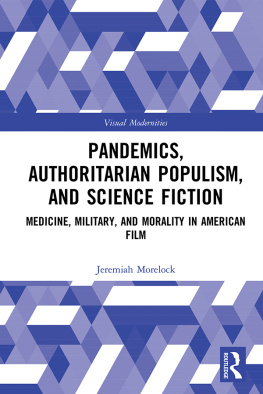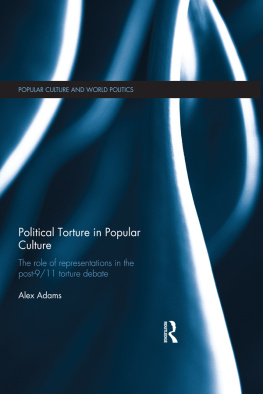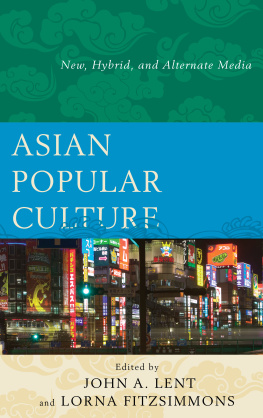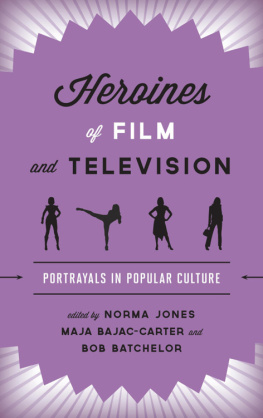
Heroes and happy endings
STUDIES IN
POPULAR
CULTURE
General editor: Professor Jeffrey Richards
Also published in this series
Christmas in nineteenth-century England Neil Armstrong
Healthy living in the Alps: the origins of winter tourism in Switzerland, 18601914 Susan Barton
Working-class organizations and popular tourism, 18401970 Susan Barton
Leisure, citizenship and working-class men in Britain, 18501945 Brad Beaven
Leisure and cultural conflict in twentieth-century Britain Brett Brebber (ed.)
The British Consumer Co-operative Movement and film, 1890s1960s Alan George Burton
British railway enthusiasm Ian Carter
Railways and culture in Britain Ian Carter
Time, work and leisure: Life changes in England since 1700 Hugh Cunningham
Darts in England, 190039: a social history Patrick Chaplin
Relocating Britishness Stephen Caunce, Ewa Mazierska, Susan Sydney-Smith and John Walton (eds)
Holiday camps in twentieth-century Britain: packaging pleasure Sandra Trudgen Dawson
History on British television: constructing nation, nationality and collective memory Robert Dillon
The food companions: cinema and consumption in wartime Britain, 193945 Richard Farmer
Songs of protest, songs of love: popular ballads in eighteenth-century Britain Robin Ganev
Women drinking out in Britain since the early twentieth century David W. Gutzke
The BBC and national identity in Britain, 192253 Thomas Hajkowski
From silent screen to multi-screen: a history of cinema exhibition in Britain since1896 Stuart Hanson
Smoking in British popular culture, 18002000 Matthew Hilton
Juke box Britain: Americanization and youth culture, 194560 Adrian Horn
Popular culture in London, c. 18901918: the transformation of entertainment Andrew Horrall
Horseracing and the British, 191939 Mike Huggins
Popular culture and working-class taste in Britain, 193039: a round of cheap diversions? Robert James
Scotland and the music hall, 18501914 Paul Maloney
Amateur film: meaning and practice, 192777 Heather Norris Nicholson
Films and British national identity: from Dickens to Dads Army Jeffrey Richards
Cinema and radio in Britain and America, 19201960 Jeffrey Richards
Looking North: Northern England and the national imagination Dave Russell
The British seaside holiday: holidays and resorts in the twentieth century John K. Walton
Heroes and happy endings
Class, gender, and nation in popular film
and fiction in interwar Britain
CHRISTINE GRANDY
Manchester University Press
Manchester and New York
distributed exclusively in the USA by Palgrave Macmillan
Copyright Christine Grandy 2014
The right of Christine Grandy to be identified as the author of this work has been asserted by her in accordance with the Copyright, Designs and Patents Act 1988.
Published by Manchester University Press
Oxford Road, Manchester M13 9NR, UK
and Room 400, 175 Fifth Avenue, New York, NY 10010, USA
www.manchesteruniversitypress.co.nk
Distributed exclusively in the USA by
Palgrave Macmillan, 175 Fifth Avenue, New York,
NY 10010, USA
Distributed exclusively in Canada by
UBC Press, University of British Columbia, 2029 West Mall,
Vancouver, BC, Canada V6T 1Z2
British Library Cataloguing-in-Publication Data
A catalogue record for this book is available from the British Library
Library of Congress Cataloging-in-Publication Data applied for
ISBN 978 0 7190 9093 6 hardback
First published 2014
The publisher has no responsibility for the persistence or accuracy of URLs for any external or third-party internet websites referred to in this book, and does not guarantee that any content on such websites is, or will remain, accurate or appropriate.
Typeset in Adobe Garamond with Gill Sans display by
Koinonia, Manchester
STUDIES IN
POPULAR
CULTURE
There has in recent years been an explosion of interest in culture and cultural studies. The impetus has come from two directions and out of two different traditions. On the one hand, cultural history has grown out of social history to become a distinct and identifiable school of historical investigation. On the other hand, cultural studies has grown out of English literature and has concerned itself to a large extent with contemporary issues. Nevertheless, there is a shared project, its aim, to elucidate the meanings and values implicit and explicit in the art, literature, learning, institutions and everyday behaviour within a given society. Both the cultural historian and the cultural studies scholar seek to explore the ways in which a culture is imagined, represented and received, how it interacts with social processes, how it contributes to individual and collective identities and world-views, to stability and change, to social, political and economic activities and programmes. This series aims to provide an arena for the cross-fertilisation of the discipline, so that the work of the cultural historian can take advantage of the most useful and illuminating of the theoretical developments and the cultural studies scholars can extend the purely historical underpinnings of their investigations. The ultimate objective of the series is to provide a range of books which will explain in a readable and accessible way where we are now socially and culturally and how we got to where we are. This should enable people to be better informed, promote an interdisciplinary approach to cultural issues and encourage deeper thought about the issues, attitudes and institutions of popular culture.
Jeffrey Richards
For Ron Grandy and Janet McLaughlin, with love
Bestselling books and hit films have much to tell us about the preoccupations, values and preferred role models of society in any given period. In this thoughtful and detailed study, Christine Grandy explores bestselling novels and cinematic hits, both British and American, to assess the extent of their engagement with contemporary concerns about the economy, gender and the nation in inter-war Britain in the aftermath of the traumatic upheaval of World War I.
Rightly rejecting the idea that such popular works are purely escapist, she argues powerfully that the main thrust of the culture was to endorse the worth of a capitalist democratic society with defined traditional heterosexual male and female gender roles. She focuses on the depiction of heroes and heroines (whom she significantly dubs the love-interest), villains and villainesses. In books and films like Sorrell and Son, she sees the culture working to re-establish pre-war masculine role models as patriotic soldier, breadwinner and pater familias. The male villain is the polar opposite of this value set and among the ranks of inter-war villains in for instance the Bulldog Drummond books and films are regularly to be found figures concerned with profit and the undermining of the national economy and social well-being profiteering businessmen, arms dealers the so-called merchants of death, sinister foreigners (Oriental masterminds, rebel Indian princes, Russian Bolsheviks) and renegade Establishment figures.







